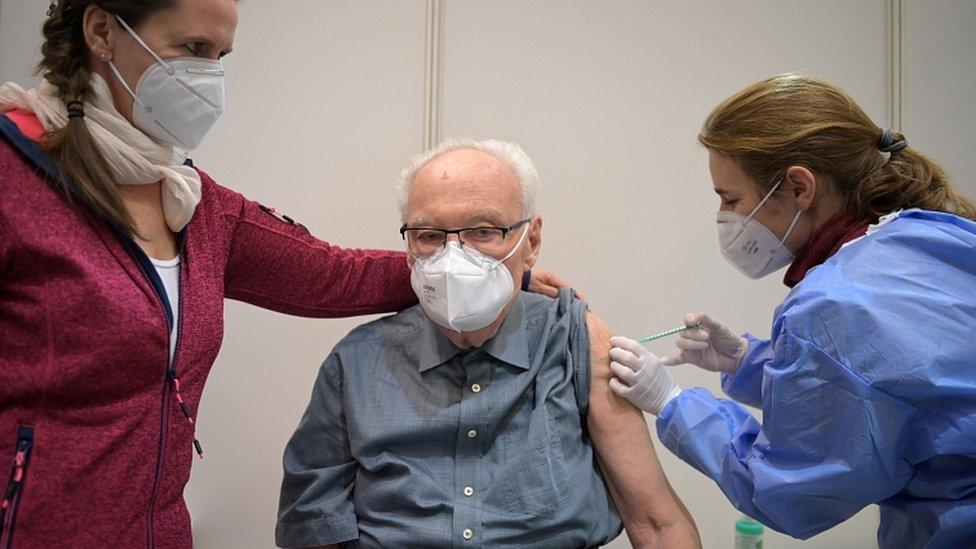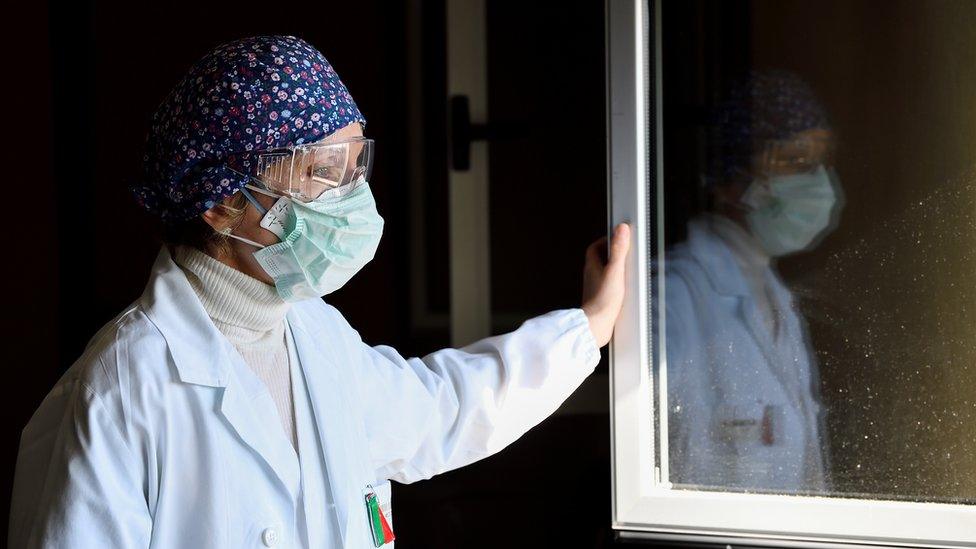Covid vaccine: Germany urged to back AstraZeneca jab for over-65s
- Published

Germany has not recommended the Oxford-AstraZeneca vaccine for older age groups
A senior German immunologist has urged his country to change its mind and start allowing over-65s to receive the Oxford-AstraZeneca vaccine.
In a BBC interview, Carsten Watzl, head of the German Society for Immunology, predicted regulators would have to reverse their decision to not recommend the jab for older people.
He urged Angela Merkel to have the vaccine live on TV to prove it is safe.
Germany's vaccine commission is currently reviewing its recommendation.
Prof Watzl's call comes after recent studies in Scotland showed the AstraZeneca jab to be effective among the elderly.
Germany is one of several EU states that have expressed doubts over the efficacy of the vaccine in older people.
The country is currently struggling to avoid a third wave of infections as cases remain stubbornly high.
The EU's medical regulator approved the use of the Oxford-AstraZeneca vaccine for all age groups in January.
But the rollout was met by some public scepticism after regulators in countries including France, Germany and Italy recommended that it should not be used for people over 65. They citied insufficient data on its efficacy for older people.
German health authorities have so far used fewer than 300,000 of the 1.17 million doses of the AstraZeneca vaccine the country has received.
In January, French President Emmanuel Macron said the jab was "quasi-ineffective" for older age groups - a claim strongly refuted by the UK government and British medical regulators. AstraZeneca itself says the vaccine is effective at all ages.

The UK is among countries that have approved the jab for all age groups.
The decision was boosted by recent research led by Public Health Scotland, which found that four weeks after the first dose, hospital admissions were reduced by 85% and 94% for the Pfizer-BioNTech and AstraZeneca jabs respectively.
Among the over 80s, there was an overall 81% reduction in the numbers admitted to hospital when the results for both vaccines were combined.
"I think Germany will also reverse course soon," Prof Watzl told BBC Radio 4's Broadcasting House programme.
"In order for us to reach our vaccination goals we need people to get this vaccine.
"We do know that the vaccine works in that age group. The recent data from Scotland clearly show it elicits an immune response, the elderly are protected from severe disease by this vaccine."
Covid symptoms: What are they and how long should I self-isolate for?
Prof Watzl predicted German regulators would "reverse course based on the data coming out of Scotland".
"If at that point [Chancellor] Angela Merkel were to go on live television and have the vaccine, that would be great," he added.
On Friday, Thomas Mertens, who heads Germany's vaccine commission, told broadcaster ZDF that the body would "very soon publish a new updated recommendation" on the AstraZeneca vaccine.
He said it was waiting for more details from the authors of the study carried out in Scotland.
"We have never criticised the vaccine," he said, describing it as "very good".
Germany has confirmed more than 2.4 million cases of the coronavirus since the pandemic began and just over 70,000 deaths.
A lockdown has been in place since mid-December but infections are still worryingly high and officials have found it difficult to ease restrictions.
Figures released last week showed the infection rate had risen to 59.3 cases per 100,000 people over the past seven days, from 57 a week earlier.
The government is due to meet next week to consider lockdown rules that run to 7 March.
Chancellor Merkel has warned that the country could be hit by a third wave of cases if the lockdown is lifted too quickly.
The interview with Carsten Watzl will be broadcast on BBC Radio 4 on Sunday at 09:00 GMT.
- Published22 February 2021

- Published24 December 2020

- Published20 February 2021

- Published5 July 2022

- Published21 February 2021
